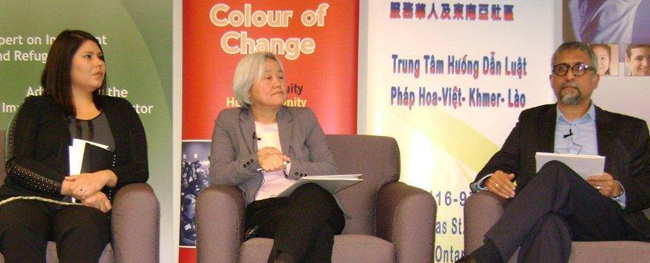Survivor kept story from daughter

By Barb Nahwegahbow
TORONTO – Krystine Abel learned about residential schools at high school, not at home from her mother Eve, who herself was a survivor.
A citizen of M’Chigeeng First Nation who grew up in Toronto, Abel joined a panel of activists to talk about reconciliation at a Toronto event titled “From Remembrance to Reconciliation – A Shared Community Dialogue on Our Roles as Treaty Peoples.”
About 150 people attended the event, which was organized by the Ontario Human Rights Commission, the Ontario Council of Agencies Serving Immigrants and the Metro Toronto Chinese and Southeast Asian Clinic. The objective was to build solidarity between communities of colour and Indigenous peoples.
Stephen Harper’s Residential School apology in 2008, said Abel, made her realize she had to reconcile her place in Toronto and in Canada as an Aboriginal woman. Like many inter-generational survivors, Krystine Abel didn’t learn about First Nations history or culture within her family.
She returned to school as a mature student because, “…that was the safest place to go and learn about my history,” she said. It was there she began to understand both the collective and personal effects of Residential School and colonization. One area where she was personally impacted by her mother’s negative experiences, she said, was with her own education. She dropped out in high school and, “…my mom didn’t try and keep me in school,” she said.
The opportunity to learn about her mother’s Residential School experience came when they were filmed for a video earlier this year. “I know it was difficult for her to do,” said Krystine, “and it was great to have a dialogue with her about something that affected her as a child.” The video titled, “Mother and Daughter: Inter-generational Effects of Residential School “, was produced by the Union of Ontario Indians and is available for viewing at http://www.youtube.com/watch?v=v2QlRj5tSqc&feature=c4-overview-vl&list=PLaQ0wUvBUPeTkCYuPCOZVZoSjivNQFilW
Justice Murray Sinclair, Chair of the Truth and Reconciliation Commission, expressed his belief that reconciliation would not be achieved in his lifetime, but, “We have to start doing something about it today. And it begins by recognizing the truth of this story, by understanding the impact of this legacy and by doing something about it.”
Former AFN National Chief Phil Fontaine, a residential school survivor, and Ontario Human Rights Commissioner Barbara Hall also spoke about the need for dialogue between Indigenous and non-Indigenous peoples.
Among those in the audience were Abel’s mother Eve, and M’Chigeeng Chief Joe Hare and his wife Susan.


